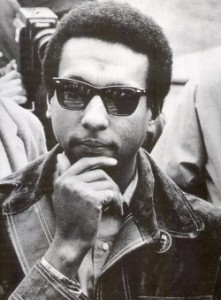Original name: KWAME TOURE (b. June 29, 1941, Port of Spain, Trinidad–d. Nov. 15, 1998, Conakry, Guinea), West-Indian-born civil-rights activist, leader of black nationalism in the United States in the 1960s and originator of its rallying slogan, “black power.”
Carmichael immigrated to New York City in 1952, attended high school in the Bronx, and enrolled at Howard University in 1960. There he joined the Student Nonviolent Coordinating Committee (SNCC) and the Nonviolent Action Group. In 1961 Carmichael was one of several Freedom Riders who traveled through the South challenging segregation laws in interstate transportation. For his participation he was arrested and jailed for about 50 days in Jackson, Miss.
Carmichael continued his involvement with the Civil Rights Movement and SNCC after his graduation with honours from Howard University in 1964. That summer he joined SNCC in Lowndes county, Alabama, for an African-American voter registration drive and helped to organize the Lowndes County Freedom Organization, an independent political party. A black panther was chosen as the party’s emblem, a powerful image later adopted in homage by the Black Panther Party.
During this period Carmichael and others associated with SNCC supported the nonviolence approach to desegregation espoused by Martin Luther King, Jr., but Carmichael was becoming increasingly frustrated, having witnessed beatings and murders of several civil-rights activists. In 1966 he became the chairman of SNCC, and during a march in Mississippi he rallied demonstrators in founding the “black power” movement, which espoused self-defense tactics, self-determination, political and economic power, and racial pride. This controversial split from King’s ideology of nonviolence and racial integration was seen by moderate blacks as detrimental to the civil-rights cause and was viewed with apprehension by many whites.
Before leaving SNCC in 1968, Carmichael traveled abroad speaking out against political and economic repression and denouncing U.S. involvement in the Vietnam War. Upon his return, Carmichael’s passport was confiscated and held for 10 months. He left the United States in 1969 and moved with his first wife (1968-79), South African singer Miriam Makeba, to Guinea, West Africa. He also changed his name to Kwame Toure in honour of two early proponents of Pan-Africanism, Ghanaian Kwame Nkrumah and Guinean S
